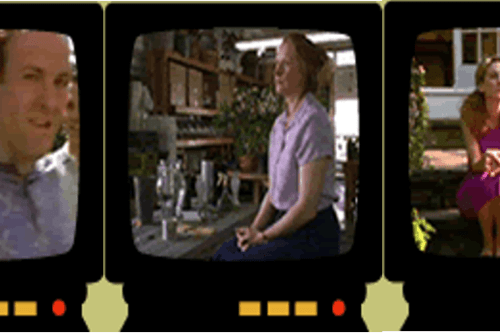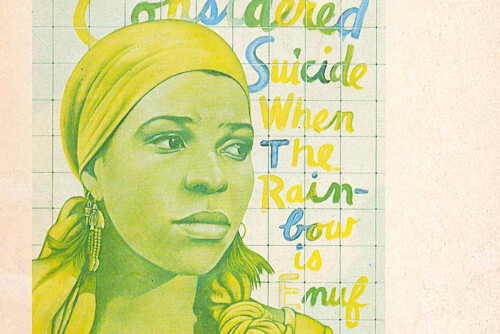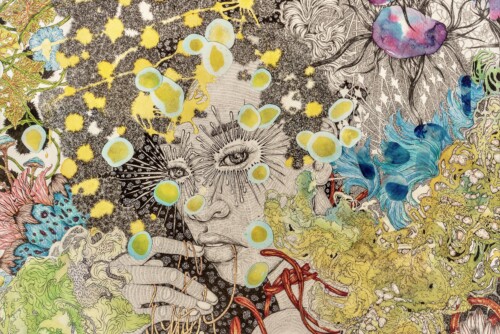In the final scene, a new dancer is being trained, and the message of the stripper as automaton—all surface and labor, a series of interchangeable female bodies—lingers as Tracee’s trademark song plays (“Living On a Thin Line” by the Kinks). Three strippers walk by, talking about her. One says she heard she went outside with Ralph and never came back. Another cautions, “Keep what you hear to yourself.” In her role as resisting reader within the text, Tracee reminds us that the stripper body has often been a site of struggle over what can be said or not said, and under what circumstances, a struggle over what is “obvious”—an ideological struggle—from the question of misogyny on The Sopranos (is the show obviously sexist or not?) to the problem of objectification in feminism (is stripping obviously oppressive or not?) to the element of commerce in all heterosexual relationships (is money merely a less obvious exchange in marriage than in lap dances?). The stripper body is, in its most euphoric formulation, a guileless, honest revelation of unspoken social conventions. But as Akass and McCabe write (about another character on the show), “This powerful narrative position—to say what should not be said—is, however, a precarious one” (154). Tracee finds out just how precarious as her resistance is shut down by the thirteen lethal blows she takes from Ralphie, yet the gruesome text of her lifeless body remains before our eyes, confronting Tony and the audience with the foolishness of the frame, a haunting critique of whore stigma.
Works Cited
Akass, Kim and Janet McCabe. “Beyond the Bada Bing!: Negotiating Female Narrative Authority in The Sopranos.” In Lavery, This Thing of Ours, 146–61.
Bauer, Dale. “Gender in Bakhtin’s Carnival.” In Feminisms: An Anthology of Literary Theory and Criticism, edited by Robyn R. Warhol and Diane Price Herndl, 708–20. 2nd ed. New Brunswick, NJ: Routledge, 1997.
Barreca, Regina. “Why I Like the Women in The Sopranos Even Though I’m Not Supposed To.” In A Sitdown with the Sopranos: Watching Italian American Culture on TV’s Most Talked-About Series, edited by Barreca, 27–46. New York: Palgrave, 2002.
Bell, Shannon. Reading, Writing, and Rewriting the Prostitute Body. Bloomington: Indiana University Press, 1994.
Chase, David. “The Real Boss of The Sopranos.” Interview by Virginia Heffernan. New York Times, February 29, 2004, late edition (East coast), p. 2.1.
———. Interview by Terry Gross. Fresh Air, NPR, March 2, 2004.
D’Emilio, John. “Capitalism and Gay Identity.” In The Lesbian and Gay Studies Reader, edited by Henry Abelove, Michele Aina Barale, and David M. Halperin, 467–76. London: Routledge, 1993.
Donatelli, Cindy and Sharon Alward. “‘I Dread You”?: Married to the Mob in The Godfather, Goodfellas, and The Sopranos. In Lavery, This Thing of Ours , 60–71.
Halberstam, Judith. “Imagined Violence/Queer Violence: Representations of Rage and Resistance.” In King and McCaughey, Reel Knockouts, 244–66.
hooks, bell. Reel to Real: Race, Sex, and Class at the Movies. New York: Routledge, 1996.
Kelly, Audrey. “Made Man: Hit After Hit, David Chase Ushers The Sopranos into Big Time.” Interview with David Chase. Fade In 6, no. 3. Excerpt available online, http://www.fadeinonline.com/chase/interview/chase.html.
King, Neal and Martha McCaughey. “What’s a Mean Woman Like You Doing in a Movie Like This?” In Reel Knockouts: Violent Women in the Movies. By King and McCaughey, 1–24. Austin: University of Texas Press, 2001.
Lavery, David, ed. This Thing of Ours: Investigating The Sopranos. New York: Columbia University Press, 2002.
Lloyd, Robert. “Mob Rules: David Chase on The Sopranos, the Small Screen, and Rock and Roll.” Interview with David Chase. LA Weekly, March 16–22, 2001, http://www.laweekly.com/ink/printme.php?eid=23162.
Modleski, Tania. Feminism without Women: Culture and Criticism in a “Postfeminist” Age. New York: Routledge, 1991.
Nagle, Jill, ed. Whores and Other Feminists. New York: Routledge, 1997.
The Sopranos. Created by David Chase. HBO. 1999–.


